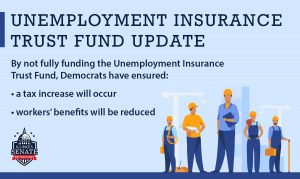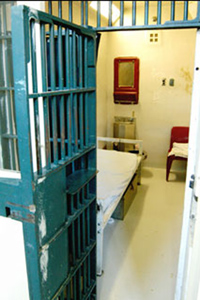 SPRINGFIELD – An ill-advised plan addressing Illinois’ unemployment insurance debt, forced through this week by Senate and House Democrats, lays the burden of state government’s fiscal irresponsibility at the feet of employers and will most likely guarantee higher taxes and cuts in benefits to workers.
SPRINGFIELD – An ill-advised plan addressing Illinois’ unemployment insurance debt, forced through this week by Senate and House Democrats, lays the burden of state government’s fiscal irresponsibility at the feet of employers and will most likely guarantee higher taxes and cuts in benefits to workers.
March 22 was the first day Senate Committees met wholly in person in Springfield, without a Zoom option, since the COVID-19 pandemic shut down the state in March 2020. Lawmakers worked long hours in the Capitol during the week to meet the March 25 deadline of moving House Bills out of Senate Committees.
Several Senate Democrat lawmakers finally joined with Senate Republicans to shut down one of Gov. JB Pritzker’s controversial appointees to the Prisoner Review Board (PRB). Many of the PRB appointees have been serving in official capacities for years without being approved by the Senate, as required by the Illinois Constitution.
On March 23, legislators and fire officials called for the passage of legislation to help alleviate a critical shortage of volunteer firefighters and Emergency Medical Services (EMS) workers in Illinois.
Democrats’ irresponsible unemployment debt plan a tax on jobs
 State Sen. Jil Tracy (R-Quincy) says Democrat lawmakers continue to shirk their fiscal responsibilities by not fully paying Illinois’ $4.5 billion unemployment insurance (UI) trust fund deficit.
State Sen. Jil Tracy (R-Quincy) says Democrat lawmakers continue to shirk their fiscal responsibilities by not fully paying Illinois’ $4.5 billion unemployment insurance (UI) trust fund deficit.
Approved this week along partisan lines, the Majority Party’s plan includes a partial payment of $2.7 billion for the UI debt, which is short $1.8 billion needed to balance out the Fund. Tracy says with a negative balance, employers and workers who suffered through Pritzker-ordered shutdowns for so many months will end up being the ones who have to pick up the slack, with what could become the largest tax increase on Illinois’ employers in history.
Tracy says lawmakers should have used the billions of federal COVID-19 relief money to fully pay its unemployment trust fund debt, similar to how most states spent the money. Instead, the Majority Party prioritized the funds on pet projects and other one-time expenses. Currently, Illinois is one of only nine states to have an unemployment insurance deficit and, even after the $2.7 billion allocation, has the fourth largest debt in the country.
Senate rejects Governor’s PRB appointee
 Gov. Pritzker received a major blow this week when his Democratic legislative allies joined Republicans to address the serious issues surrounding the Prisoner Review Board, which is charged with determining parole for some of the state’s most violent criminals.
Gov. Pritzker received a major blow this week when his Democratic legislative allies joined Republicans to address the serious issues surrounding the Prisoner Review Board, which is charged with determining parole for some of the state’s most violent criminals.
On March 22, after nearly a year of calls from Senate Republicans, the Senate Executive Appointments Committee took up six of Pritzker’s unconfirmed Prisoner Review Board (PRB) appointees; however, only one appointee was presented before the full Senate this week.
PRB appointee Jeff Mears was voted down by a 22-19 vote. He needed 30 affirmative votes for confirmation. Eighteen Democrats sat out the vote. Following the vote, Senate Democrats said their intent on Monday, March 28, was to take up some of the remaining unconfirmed appointees—two of which are the most controversial members on the board and will reach their deadline for confirmation on Monday, March 28.
Currently, only eight board members remain—five of whom have so far escaped the Constitutionally-required confirmation process.
The Illinois Constitution requires that appointees be confirmed by the Senate within 60 session days. Pritzker has often pulled his appointments right before the deadline, just to turn around and reappoint them to reset the 60-day clock—intentionally skirting the process outlined in the Constitution.
Addressing shortage of volunteer emergency workers
 A bipartisan group of legislators joined the Illinois Firefighters Association officials at the Capitol March 23 to call for the passage of legislation to help alleviate the critical shortage of volunteer fire and EMS workers in Illinois.
A bipartisan group of legislators joined the Illinois Firefighters Association officials at the Capitol March 23 to call for the passage of legislation to help alleviate the critical shortage of volunteer fire and EMS workers in Illinois.
Modeled after legislation passed in New York, Senate Bill 3027 would provide a $500 state income tax credit for volunteer emergency workers who earn less than $10,000 in stipends for their service to the fire department.
“Many smaller and more rural communities in west-central Illinois rely on volunteer firefighters, EMS personnel and paramedics,” Tracy said. “This legislation offers these volunteer emergency workers a $500 income tax credit as a token of our appreciation. We are inspired and thankful for their courage and selfless dedication to protect their fellow residents.”
Cosponsored by Tracy, Senate Bill 3027 passed the Senate by a unanimous vote on Feb. 23, but a vote has been put off in the House of Representatives.
“There is a public safety crisis going on throughout the state, with the number of emergency calls to fire departments tripling (the majority of which are for EMS) and the number of volunteer emergency workers plummeting. This reflects a nationwide shortage of volunteers, contributing factors which include: the aging population of volunteers, increased training requirements, and newer policies, which prohibit full-time firefighters from volunteering in their own communities,” explained Highland Fire Chief Kerry Federer.
“The message we want to get out today is two-fold: first there is a dire need for this legislation to pass; and secondly, we want to encourage people to consider becoming a volunteer fire or EMS worker and make a major difference in the lives of their community. Not all departments are totally volunteer, and some compensate per call while others provide stipends or reimbursement for expenses,” explained Illinois Firefighters Association Legislative Chair Kevin Schott.
Founded in 1889, The Illinois Firefighters Association (IFA) is dedicated to the advancement of the Fire Service by providing leadership through education, training, benefits, and information networking at the local, state, and national levels.
